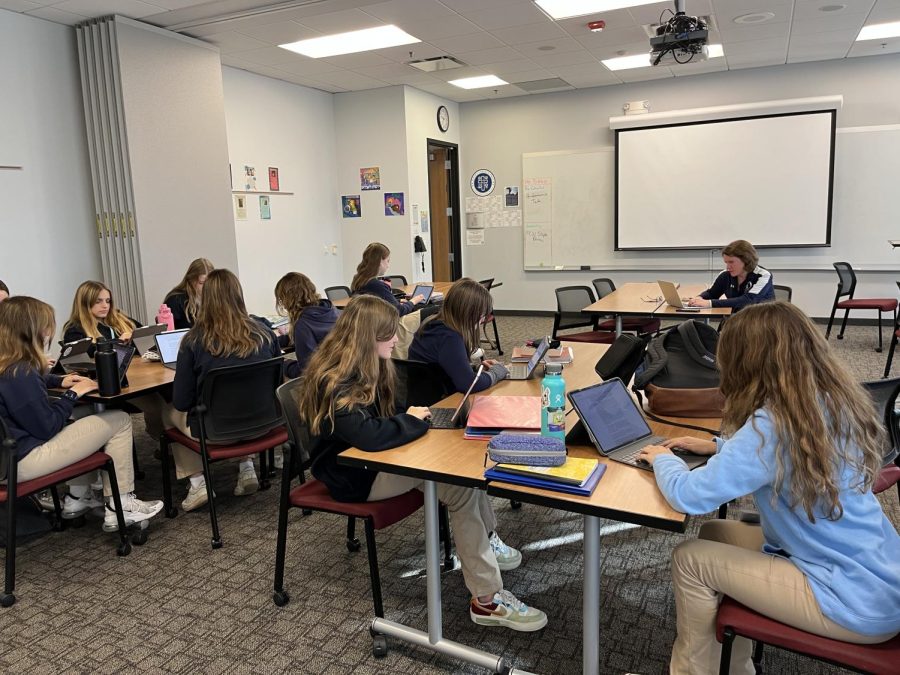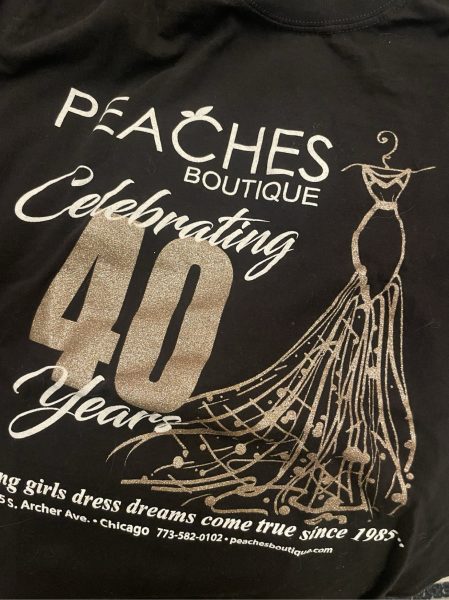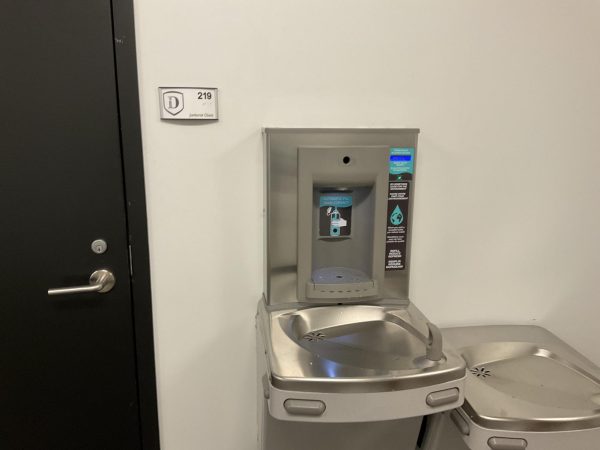OPINION: FRESH period club structure is too limiting
The Ram Page is one of several clubs that meet during FRESH period on Fridays.
This year at DePaul College Prep, the school has debuted a new class schedule. Although there are several changes, including a later dismissal time and a new format for lunch, FRESH period seems to be the change on everyone’s minds.
This new period occurs during the forty minutes after first period. Depending on the day, students may have clubs, advisory, or a study hall period during FRESH. Every Monday and Friday, students have the opportunity to attend clubs. FRESH periods also include clubs on Wednesdays, unless it is a colloquium day. Roughly every other week, students have advisory meetings during FRESH period on either Tuesday or Thursday.
If you are confused, don’t worry — I am too.
Like every change to school policy, the change has been met with mixed reactions. Some students appreciate the new period, emphasizing the myriad of uses they have for the extra time.
Because of the FRESH period, every teacher is available at the same time. To some students, this makes a big difference in terms of the availability of office hours.
Maggie Taylor, a Junior, emphasized the importance of FRESH period from an academic perspective.
“I like FRESH because it gives you time to ask questions to your teachers if you need help,” said Taylor.
Freshman Ellis Garcia agrees. In addition to allowing students time to talk to teachers, the FRESH period gives students like Ellis time to study and take a break from the school day.
“It really helps me get work done and study hard. It’s an amazing break for me during the school day.”
With the 7:45 AM early start to the school day and the new 3:05 PM end time, breaks during the day are more important than ever.
Most of the students I talked to appreciate the FRESH period for the chance to work on school work and take a break from the long class periods of the school day, but one issue came up repeatedly.
The combination of FRESH period and clubs is an issue.
Because clubs happen during FRESH period, clubs may only schedule times to meet during two or three days each week. This is a distinct change from years past at DePaul Prep where clubs happened after school, allowing club meetings to occur five days a week.
There are benefits to this new club scheduling. Because clubs do not meet after school, students who are enrolled in sports or who have after-school commitments such as sports or jobs, are now able to participate in clubs. Students who may previously have never considered attending a club, are often more interested in clubs because they have extra time during FRESH.
Unfortunately, this schedule is not without downsides. Because the new setup restricts the times clubs can meet, students are only able to truly commit to a maximum of three clubs. Many students who previously attended a variety of clubs are now forced to drop out of several clubs.
Even students who were only in two or three clubs last year may find that the two or three clubs they enjoy now meet on the same day.
On Fridays, Latino Unidos, Ram Slam Poets, the DePaul Prep Speech Team, Jew Crew, Yearbook, Ram Page, and more all meet during the same forty minutes. Wednesdays overlap Mind The Cap, Identity Club, Debate Team, and Dungeons and Dragons Club, all of which have historically shared a significant number of members.
Thirteen different clubs meet on Mondays alone.
In a school that values commitment to varied interests and multifaceted participation, this is disappointing.
Eliana Garcia, a senior, participates in six different clubs but finds that every club they are a part of meets on the same day as at least one of their other clubs. They discussed their desire for a more spread-out club schedule with less overlap.
“I wouldn’t have to constantly prioritize clubs and apologize to the others for not attending as much.”
Although they mentioned appreciating the FRESH period as a whole, when asked if it was a good time for clubs they took a more nuanced perspective.
“Though it is a good option for clubs, I don’t think it should be the only option for clubs.”
Kira Ramberan is a freshman who participates in a wide variety of clubs, several of which hold meetings on the same day.
Although Kira also appreciates the academic advantages of FRESH period, she also would prefer if more clubs met after school.
“It would make a huge difference because I would be able to attend a lot more clubs. It’s hard to pick between two clubs, especially when they only meet once a week for 40 minutes, sometimes only once every two weeks. If more clubs met after school, there would be less schedule conflicts, and choosing which clubs to attend would be less stressful,” said Ramberan.
These new club meetings also have to be relatively brief, limiting students’ ability to leave one club early to attend two separate meetings.
While after school clubs in years previous had been able to meet for however long they needed, the new schedule only allows for one forty minute club meeting per week. In addition to the obvious restriction this puts on the activities a club can do, this limits students’ ability to leave one club early to attend two separate meetings.
Like all things, FRESH Period comes with advantages and disadvantages, but it is important to recognize the significant impact these disadvantages have on our school community.
In the DePaul Prep Mission Statement, our community expresses the goal to strive for excellence.
According to the DePaul Prep Mission Statement, “We define excellence as challenging you to go beyond your own comfort level in the classroom, on the court, with friends, on the stage, or in our maker spaces. By fostering unique gifts and self-respect in each student, we develop a sense of confidence and integrity you express in every facet of life.”
The chance to participate in a wide variety of clubs and extracurricular activities has always been a tremendous part of that. After all, it’s hard to find your unique gifts without exploring new things, and when the options to join clubs are limited, it’s difficult to justify going beyond your comfort level to try new things.
As the quarter ends, it seems the perfect time to analyze the changes we’ve made as a school this year.
Because of this, I offer three questions for your consideration:
In a community that boasts on our fliers and website about our “40+ co-curricular activities,” why are we limiting our students to exploring only three?
Is this limit really the best way to live our core values?
And, most of all, what must be done?
Clarification: Co-curriculars are allowed to meet after school, and some of them do.








Ms. Heninger • Nov 7, 2022 at 19:20
Very well said Olly. As a CoCurricular moderator myself, I also have faces similar problems. I have lost a lot of members this year because they can no longer commit to all of the clubs they were previously in. If students haven’t dropped the club completely, they can only come once a month because they have to rotate between the other three clubs they go to that meet on Friday, usually missing crucial information.
As I’m sure you know, there is bound to be trial and error when it comes to implementing new structures, such as this. I know some larger clubs and academic teams are meeting before or after school due to their large sizes so maybe others will follow suit!
Thank you for sharing your and others opinions on this matter 🙂